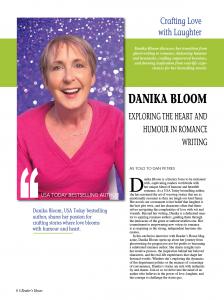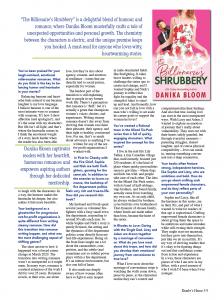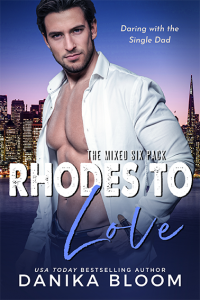Danika Bloom captivates readers with her heartfelt, humorous romances and empowers aspiring authors through her dedicated mentorship.
In this exclusive interview with Reader's House Magazine, Danika Bloom opens up about her journey from ghostwriting for progressive not-for-profits to becoming a celebrated romance author. She shares insights into her creative process, the inspiration behind her beloved characters, and the real-life experiences that shape her fictional worlds. Whether she's exploring the dynamics of fire department politics or the nuances of a marriage of convenience, Danika's stories are rich with authenticity and charm. Join us as we delve into the mind of an author who believes in the power of love, laughter, and the courage to challenge the status quo.
You've been praised for your laugh-out-loud, emotional rollercoaster romances. What do you think is the key to balancing humor and heartache in your stories?
Balancing humour and heartache feels natural to me because laughter is my love language. I believe humour is one of the most intimate ways to connect with someone. It's how I show affection (and apologize!), and it's the same with my characters. But life isn't all light, and that's where the heartache comes in. I think the emotional weight of a story lands harder when the reader has also been able to laugh with the characters. In a way, the humour makes the heartache hit deeper, but also makes it feel more bearable.
Your background as a ghostwriter for progressive not-for-profit organizations is quite different from writing steamy romance. How did this transition into romance writing happen, and what was the most challenging aspect of shifting genres?
The short answer to how it happened was a forced career change in March 2020. The transition into writing romance wasn't as unexpected as it might seem. In many ways, romance is a natural extension of the work I did for over 25 years. Romance novels, at their core, are about love, but they're also about agency, consent, and emotional resilience—issues that are directly tied to social justice, especially for women.
The hardest part of the transition is still explaining that to people in my former work life. There's a perception that romance is ‘fluff,' but it's actually a genre that champions women's voices, desires, and experiences. Writing steamy romance doesn't shy away from showing that women can claim their pleasure, their agency, and their right to healthy, consensual love. For me, that's as much about advocacy as anything I've written for any of the not-for-profit organizations I worked with.
In First In: Cheeky with the Fire Chief, Sophie and Nick are both firefighters, gunning for the same job. In addition to the enemies to lovers romance, the backdrop of fire department politics feels very rich and true-to-life. How did you research this book?
My husband and I both spent several years as volunteer firefighters with a busy small-town fire department, responding to around 50 calls each year. So while Sophie and Nick's story is purely fictional, the setting and the dynamics of fire department politics come directly from my real-life experiences. Being on the front lines taught me a lot about the camaraderie, competition, and the subtle (and sometimes not-so-subtle) power plays within a fire department. It's an intense environment, but also one full of heart.
It also made me deeply aware of how women often have to fight to earn respect in male-dominated fields like firefighting. It takes brave leaders willing to challenge the status quo to create real change, and I wanted Sophie and Nick's journey to reflect that fight for equality and the strength it takes to stand up and lead. And honestly, how can you not fall in love with a man who's willing to set aside his career goals to support the woman he loves?
You've created a fictional town in the Mixed Six-Pack series that is full of quirky, engaging characters. What inspired the concept for the series?
I live in the real-life Lily Valley, a tiny Canadian village that, until recently, boasted just 250 residents. It's the kind of place where quirky personalities seem to gravitate—where dogs and kids run wild, and people take care of each other. The idea for the Mixed Six-Pack series, with its band of half-siblings, step-brothers, and found family, actually came from watching my own son. As an only child, he always wished for brothers, so he built his own brotherhood. That dynamic of chosen family, where bonds are made rather than born, became the heart of the series.
In Rhodes to Love: Daring with the Single Dad, Lizzy and Adam are drawn together by a marriage of convenience. What do you love most about this trope, and how did you develop their emotional journey from convenience to true love?
What I love most about the marriage of convenience trope is watching the walls come down, piece by piece, as the characters realize they can't control and compartmentalize their feelings. And also that true, lasting love can start in the most unexpected ways. With Lizzy and Adam, I wanted to explore an emotional journey that's really about vulnerability. They start out with their hearts safely guarded, but through everyday moments—parenting struggles, shared laughter, and of course physical compatibility—love can sneak in, turning something convenient into a deep connection.
Your books often feature strong, independent heroines, like Sophie and Lizzy, who are ambitious and bold. How do you go about crafting such empowered female characters, and do they reflect parts of your own personality?
Sophie and Lizzy, like all the heroines in this series, are in their 20s, and part of what I wanted to write for readers of that age is aspirational. Crafting empowered female characters is about giving them the space to be ambitious and make mistakes while still owning their strength. They might start out uncertain, but they grow into themselves, just like we do in real life. It's my way of showing readers that it's okay to be figuring things out and that confidence comes from action and experience. In a way, these characters are pieces of who I am now in my fifties, with a good amount of who I wish I'd been when I was younger.
Ben Alan
Reader's House
email us here
Visit us on social media:
Facebook
Instagram
Legal Disclaimer:
EIN Presswire provides this news content "as is" without warranty of any kind. We do not accept any responsibility or liability for the accuracy, content, images, videos, licenses, completeness, legality, or reliability of the information contained in this article. If you have any complaints or copyright issues related to this article, kindly contact the author above.
© 2025 Benzinga.com. Benzinga does not provide investment advice. All rights reserved.
Trade confidently with insights and alerts from analyst ratings, free reports and breaking news that affects the stocks you care about.


